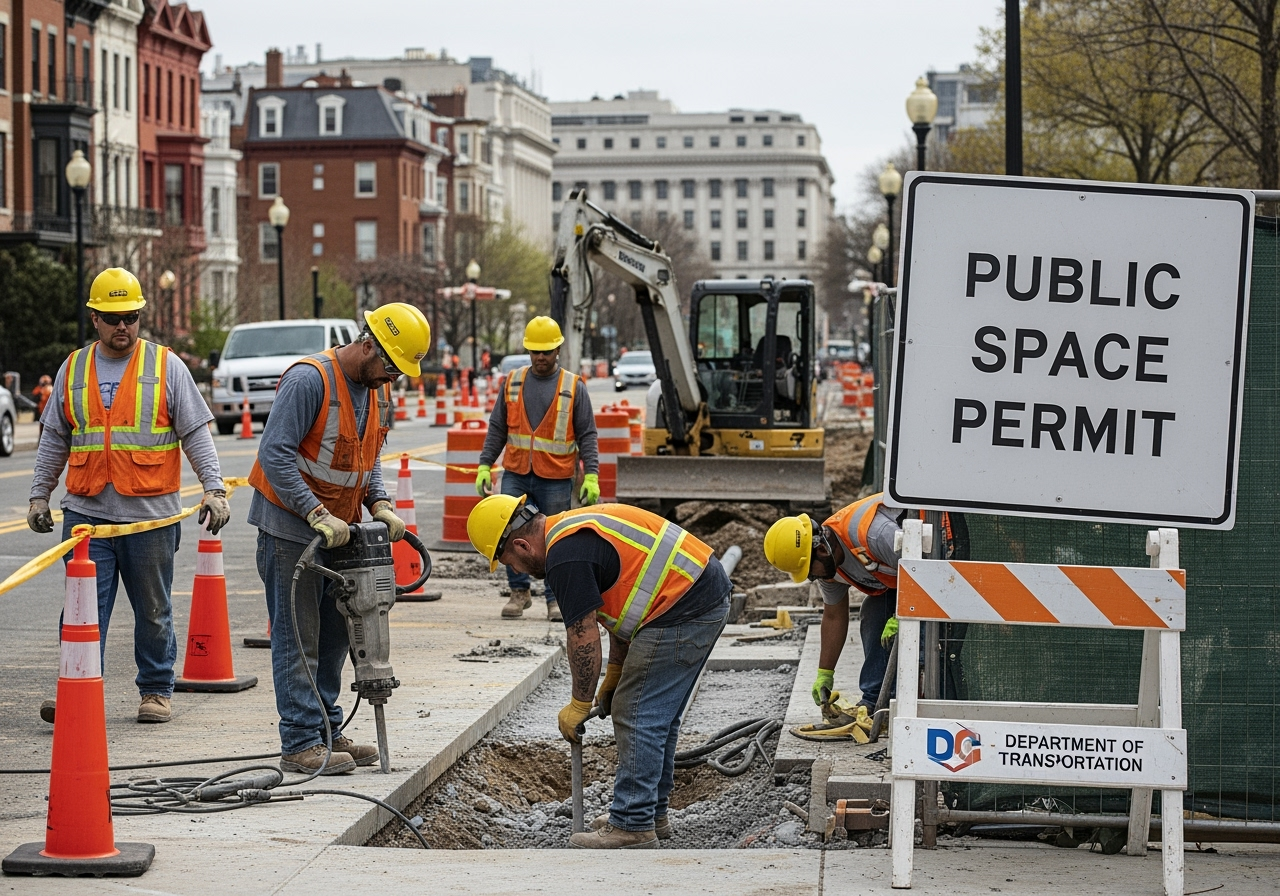Complete Guide to DC Right of Way Permits: Requirements, Process & Expert Tips
Men Working in Public Space
Navigate DC Right of Way Permits with confidence. Learn requirements, step-by-step process, and expert tips to streamline your permit application in Washington DC.
When working on construction projects, utility installations, or street improvements in Washington DC, understanding the Right of Way permit process is crucial for project success. Whether you're a contractor, developer, or business owner, this comprehensive guide will walk you through everything you need to know about DC Right of Way permits.
What Are DC Right of Way Permits?
DC Right of Way permits are official authorizations required for any work performed within the public space of Washington DC. This includes sidewalks, streets, alleys, and other areas owned by the District of Columbia government.
Purpose and Importance
Right of Way permits serve several critical functions:
Public Safety: Ensure all work meets safety standards and doesn't endanger pedestrians or motorists
Infrastructure Protection: Prevent damage to existing utilities, roads, and public facilities
Traffic Management: Coordinate construction activities to minimize disruption to traffic flow
Revenue Generation: Provide funding for public infrastructure maintenance through permit fees
Legal Compliance: Protect contractors and property owners from liability issues
Without proper permits, you risk facing hefty fines, work stoppages, and potential legal complications that can significantly delay your project and increase costs.
DC Right of Way Permit Requirements
Essential Documents
To obtain a DC Right of Way permit, you'll need to prepare several key documents:
Basic Application Materials:
Completed permit application form
Detailed site plans and construction drawings
Traffic control plan (if applicable)
Proof of insurance (minimum $1 million general liability)
Contractor's license verification
Property owner authorization (if different from applicant)
Technical Documentation:
Utility location markings (Miss Utility tickets)
Structural engineering plans (for major excavations)
Environmental impact assessments (when required)
Restoration plans for affected areas
Permit Fees Structure
DC Right of Way permit fees vary based on several factors:
Standard Fees:
Application processing fee: $50-$200
Daily occupation fees: $25-$100 per day
Square footage charges: $2-$5 per square foot
Lane closure fees: $500-$2,000 per day
Additional Costs:
Expedited processing: 50% surcharge
After-hours work permits: $200-$500
Bond requirements: 10-20% of project value
Inspection fees: $100-$300 per inspection
Note: Fees are subject to change and may vary based on project scope and location.
Step-by-Step Permit Application Process
Step 1: Pre-Application Planning (1-2 weeks)
Before submitting your application:
Contact Miss Utility for underground utility markings
Review zoning requirements and restrictions
Prepare all required documentation
Schedule pre-application consultation (recommended)
Step 2: Application Submission
Submit your complete application through:
Online Portal: DC's ePermits system (fastest option)
In-Person: DDOT Public Space Permitting Office
Mail: Not recommended due to processing delays
Common Pitfall: Incomplete applications are the #1 cause of delays. Double-check all required documents before submission.
Step 3: Initial Review (5-10 business days)
DDOT staff will conduct an initial review to ensure:
All required documents are included
Application meets basic requirements
Fees are properly calculated and paid
Step 4: Technical Review (10-20 business days)
During technical review, various departments may evaluate:
Engineering specifications
Traffic impact assessments
Environmental considerations
Utility conflicts
Area for Improvement: This stage often experiences the longest delays due to interdepartmental coordination issues.
Step 5: Permit Issuance
Once approved, you'll receive:
Official permit document
Approved site plans
Special conditions or requirements
Contact information for inspections
Expert Tips for Streamlining Your Permit Process
Before You Apply
Tip #1: Start Early
Begin the permit process 4-6 weeks before your planned start date. Complex projects may require even more lead time.
Tip #2: Invest in Quality Plans
Professional, detailed drawings reduce review time and minimize revision requests. Poor-quality plans are a major cause of delays.
Tip #3: Understand Seasonal Restrictions
DC has moratoriums on certain types of work during peak traffic periods and winter months. Plan accordingly.
During the Application Process
Tip #4: Maintain Open Communication
Respond promptly to reviewer comments and questions. Delayed responses restart the review clock.
Tip #5: Consider Expedited Processing
For time-sensitive projects, the expedited review option can reduce processing time by 50%.
Tip #6: Prepare for Inspections
Schedule required inspections in advance and ensure work is ready for review to avoid delays.
Common Mistakes to Avoid
Documentation Errors
Submitting outdated or incorrect forms
Missing required signatures or notarizations
Inadequate insurance coverage documentation
Technical Mistakes
Insufficient traffic control planning
Failure to coordinate with utility companies
Inadequate restoration specifications
Process Missteps
Not allowing sufficient processing time
Failing to respond to reviewer comments promptly
Starting work before permit approval
Benefits of Hiring a Professional Permit Expediter
Navigating DC's Right of Way permit process can be complex and time-consuming. Here's how a professional permit expediter can help:
Expertise and Experience
Deep Knowledge: Understanding of current regulations and requirements
Relationship Building: Established connections with reviewing departments
Problem Solving: Quick resolution of issues that arise during review
Time and Cost Savings
Faster Processing: Expedited review through proper preparation and follow-up
Reduced Delays: Proactive identification and resolution of potential problems
Cost Control: Avoiding expensive mistakes and rework
Peace of Mind
Compliance Assurance: Confidence that all requirements are met
Progress Tracking: Regular updates on application status
Risk Mitigation: Professional handling reduces liability exposure
When to Consider Professional Help
You should consider hiring a permit expediter if:
Your project has tight deadlines
You're unfamiliar with DC permitting requirements
Your application involves complex technical elements
You've experienced delays or rejections in the past
The cost of delays exceeds the expediter fee
Conclusion
Successfully obtaining a DC Right of Way permit requires careful planning, attention to detail, and thorough understanding of the process. While it's possible to navigate the system independently, the complexity and potential for costly delays make professional assistance a valuable investment for many projects.
By following the guidelines and expert tips outlined in this guide, you'll be better prepared to tackle your Right of Way permit application with confidence.
Ready to streamline your DC permit process?
Don't let permit delays derail your project timeline. At MCG Permits, we specialize in navigating DC's complex permitting landscape, ensuring your Right of Way permits are processed efficiently and correctly the first time.
Contact us today at mcgpermits.com for a free consultation and discover how our expert permit expediting services can save you time, money, and frustration on your next DC project.
Get your permits faster. Get back to building.

